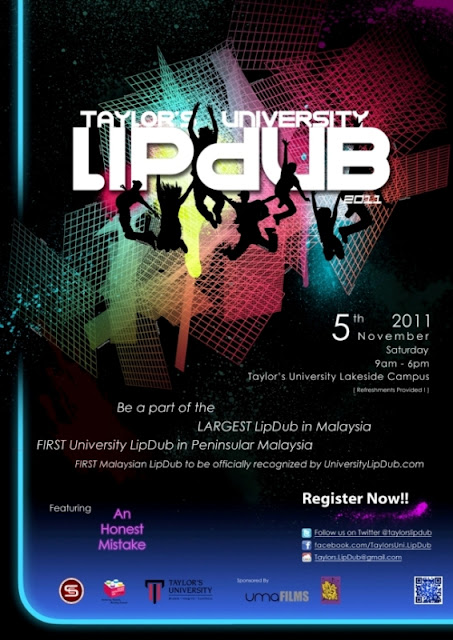They are saying that Malaysia's Universities cares more about earning revenue while neglecting the real objectives of being an institution which is to provide a good quality education to our students. Well, according to the article, Thank God Taylor's is not one of the Uni got fined for not being able to lift up to the promised standard of education.
Malaysia Tries to Rein In Private Education Institutions

Rahman Roslan for the International Herald Tribune
Taylor's University is one of Malaysia’s oldest private higher-education institutions.
By LIZ GOOCH
Published: October 2, 2011
KUALA LUMPUR — Malaysia’s private higher-education institutions are coming under greater scrutiny, with the government imposing a record number of fines on errant operators this year.
Having expanded rapidly in the last 15 years, the private sector is widely credited with increasing access to higher education in Malaysia, but education experts say standards vary greatly.
While some view the increasing number of fines issued to private providers as cause for concern, others say that they are an indication that regulators are doing a more effective job weeding out inferior companies. And some analysts say the government’s actions are an attempt to safeguard the reputation of the industry.
In a statement, the Ministry of Higher Education said that while it hoped that the private sector would continue to grow, ensuring that providers offered quality education was crucial.
“The challenges are in striking the right balance between promoting growth in higher education in Malaysia and providing quality education,” the ministry said. “This is important because Malaysia is progressing toward becoming a developed nation where knowledge workers are an important element in the agenda for growth and at the same time, Malaysia is also aspiring to become the hub of higher education in the region.”
The statement added that while the government hoped that the private sector would expand further, applications for new institutions would be determined based on whether the institution met the application criteria and whether its proposed programs were “aligned to the critical area needed by the country.”
The ministry issued fines to 47 private education institutions from January to March this year, following regular audits, inspections and complaints from the public. Last year, 48 institutions received fines throughout the year, compared to 9 in 2009. Institutions were fined for a range of infractions, from making false or misleading statements promoting their institutions to offering unaccredited courses and violating registration regulations such as operating on unregistered premises.
Malaysia’s private higher-education sector has expanded rapidly since the government introduced legislation in 1996 to allow the establishment of private universities. Prior to the sector’s liberalization, local private institutions offered programs in conjunction with overseas universities but were unable to award their own degrees.
Since 1996, the number of private universities and colleges that offer degree and nondegree courses has grown substantially, with Malaysia now home to 26 private universities, which offer degrees at the bachelor’s, master’s and doctorate level.
An additional 23 private “university colleges” offer bachelor’s degrees only, 5 foreign universities from countries like Australia and Britain have established branch campuses and there are more than 400 private colleges that offer diploma and certificate courses.
Part of the aim of liberalizing the higher-education sector was to help increase access to postsecondary education and bolster Malaysia’s “human capital,” said Tham Siew Yean, a professor at the Institute of Malaysian and International Studies at the National University of Malaysia. She said the postsecondary enrollment rate for Malaysians aged 18 to 23 rose to 44 percent in 2010 from 29 percent in 2003, or students enrolled in any type of higher education.
There are now more students studying in the private sector than in public institutions, with private institutions accounting for almost 54 percent.
Ms. Tham said that there was a “tremendous diversity” of programs and that the provision of government loans for private courses had helped increase the number of students studying in the private sector.
Lee Hock Guan, a senior fellow at the Institute of Southeast Asian Studies in Singapore, said: “For an average student, it’s not too difficult to get into higher education nowadays in Malaysia. There are so many places competing for them.”
Yet analysts say standards at some private institutions are insufficient while some accuse the government of playing catch-up in its attempt to weed out inferior providers.
“The Ministry of Education does have a problem of quality control,” Mr. Lee said, adding that standards varied greatly between private universities. “There are some that are decent but some that are pretty weak.”
Employers have long complained that graduates from Malaysian universities, public and private, lack vital talents like communication skills.
“We are getting more and more complaints from employers that they are getting students who are not up to the mark,” Mr. Lee said, adding that some institutions enroll students who may not be qualified. “For many of the private universities, they are quite lax because their main thing is they have to enroll as many students as possible in order to generate revenue.”
Mr. Lee contends that the government is monitoring the private sector more closely to ensure that Malaysia’s reputation does not suffer among prospective international students. Malaysia has set the goal of attracting 200,000 international students by 2020.
“Fearing that there will be a drop in foreign students, that has pressured the government to better regulate the private sector,” he said.
Others view the increasing number of fines as a sign that the regulators are doing their job more effectively.
“More fines means they are controlling people who are not doing the right thing,” said Molly Lee, a senior program specialist in higher education at Unesco Asia Pacific in Bangkok. “To me it’s a good sign from the regulatory perspective.”
Ms. Lee, who described Malaysia’s private higher-education sector as “dynamic, innovative and competitive,” said the country was well equipped to monitor private providers.
“I am sure the concern of quality of private institutions is always there,” she said. “I think over time the better ones are gaining a good reputation while the bad ones are being identified by the authorities.”
Ms. Tham, the professor, said that stringent regulations governed the private sector but that before the last two years, there had been little information available about private colleges being fined.
“I would say the ministry perhaps may have had problems being able to monitor the large number of providers,” she said. “I think that it’s good that they are acting on it, that they are able to be more effective in their monitoring.”
Hassan Said, vice chancellor and president of Taylor’s University, one of Malaysia’s oldest private higher-education institutions, which was not among the fined institutions, estimated that only 5 percent of private providers did not comply with government regulations.
“Although the number is small, its impact to the other private providers is pretty bad,” he said in an e-mail. “Hence the move by the ministry to impose stricter monitoring of the private sector is timely and should be supported.”
Taylor’s University, which has 11,700 students, began offering nondegree courses in 1969 and was upgraded to university status last year. The institution began offering degree programs in the 1990s via programs with other universities, before offering its own bachelor degrees in 2006, followed by master’s and doctorate programs last year.
Mr. Hassan said that while the lesser-quality providers could make it more difficult for reputable private institutions because “ the negative perception by stakeholders will be generalized to the whole industry,” students and parents were becoming better equipped to select the quality providers because information about the institutions was widely available.
Parmjit Singh, president of the Malaysian Association of Private Colleges and Universities, said he supported the government’s moves to be more vigilant.
“It will bring integrity to the industry,” he said. “Over the years, there have been colleges that have popped up. My view is some of them should not have been allowed to be registered.”
But Mr. Parmjit said some institutions had made “innocent mistakes” that could result in fines, like not listing the correct course approval code on a brochure.
“One could not generalize and say that all those who have been fined are bad players,” he said.
Mr. Parmjit said that the increase in fines was not indicative of any broader trend within the sector and that “market forces” would force poor-quality providers out of business.
“The bottom line is that market forces are in play,” he said. “If anyone does a poor job, their time will be limited.”





































































